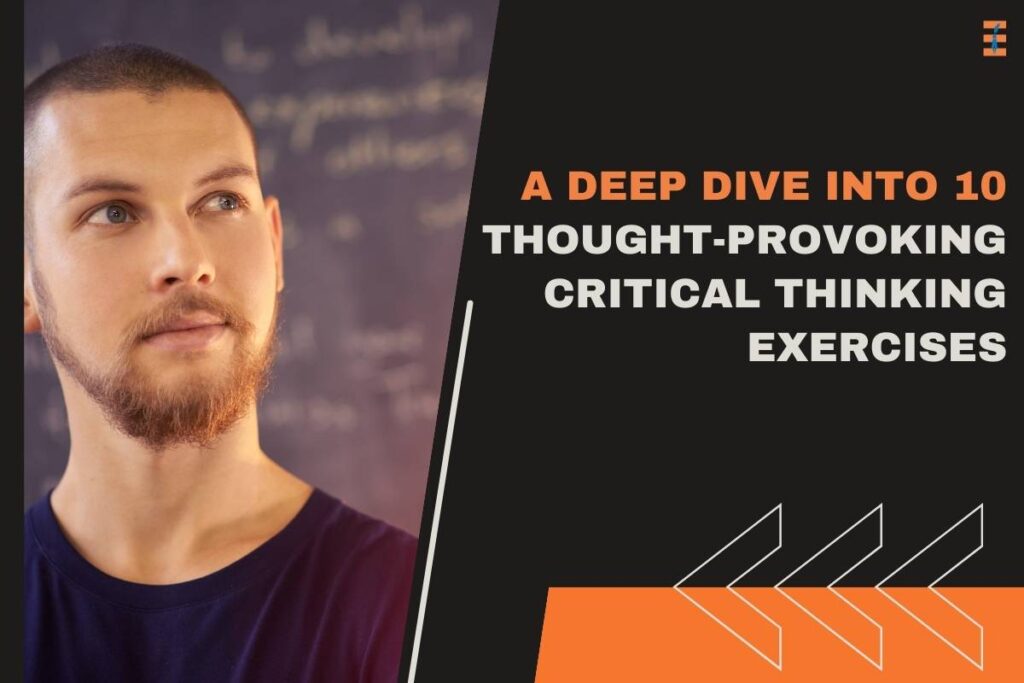Today, information bombards us from all directions, and the ability to think critically has become a paramount skill. Beyond the rote memorization of facts, critical thinking exercises involve the analysis, evaluation, and synthesis of information to make informed decisions. In this comprehensive guide, we’ll explore ten engaging and effective critical thinking exercises designed to enhance cognitive abilities, foster intellectual agility, and contribute to overall cognitive excellence.
List of Critical Thinking Exercises:
1. Socratic Questioning: Unlocking Wisdom through Dialogue

The Socratic method, with its roots in ancient philosophy, serves as a foundational exercise for critical thinking. It involves posing open-ended questions stimulating thoughtful dialogue and exploring complex topics. The exercise encourages individuals to engage in structured discussions, challenging assumptions, and dissecting various perspectives on a chosen subject matter.
Exercise: Organize or participate in Socratic discussion groups where participants tackle topics ranging from ethical dilemmas to societal issues. The goal is to foster an environment where thoughtful questioning leads to a deeper understanding of the subject matter.
2. Brain Teasers and Puzzles: Nurturing Analytical Thinking
Solving puzzles, riddles, and brain teasers is a classic exercise for enhancing problem-solving skills and developing cognitive flexibility. Engaging in these activities challenges the mind, fostering creativity and adaptability.
Exercise: Dedicate regular time to solving Sudoku, crosswords, or logic puzzles. These exercises provide mental stimulation and improve memory, concentration, and logical reasoning.
3. Debate Club Participation: Sharpening Persuasive and Analytical Skills
Joining a debate club provides a platform to practice constructing persuasive arguments, critically evaluating opposing viewpoints, and refining communication skills. The exercise encourages individuals to think on their feet, respond to counterarguments, and strengthen their ability to convey ideas convincingly.
Exercise: Actively participate in structured debates on topics ranging from current affairs to philosophical dilemmas. This fosters the development of not only critical thinking but also effective communication.
4. Case Study Analysis: Applying Critical Thinking to Real-World Scenarios

Analyzing real or hypothetical case studies allows individuals to apply critical thinking exercises to assess situations and propose effective solutions. This exercise mimics the problem-solving demands of various professions and prepares individuals to think critically in real-world contexts.
Exercise: Review business case studies, legal scenarios, or medical cases, identifying key issues and recommending strategic approaches. This hands-on approach enhances decision-making skills.
5. Concept Mapping: Visualizing Complex Ideas for Better Understanding
Creating visual representations of ideas, relationships, and hierarchies through concept mapping enhances understanding and promotes analytical thinking. This exercise encourages individuals to see the interconnectedness of concepts and improves visual-spatial thinking.
Exercise: Utilize mind maps or concept maps to illustrate complex concepts or plan projects. This visual approach aids in organizing thoughts, identifying relationships between ideas, and enhancing overall comprehension.
6. Decision-Making Simulations: Learning Through Virtual Scenarios
Participation in decision-making simulations replicates real-world scenarios, encouraging thoughtful analysis and strategic thinking. This exercise allows individuals to make decisions within a controlled environment, experiencing the consequences of their choices.
Exercise: Explore online simulations or business strategy games that require strategic decision-making. These simulations provide a risk-free environment for learning and testing different decision-making approaches.
7. Read Diverse Perspectives: Broadening Horizons through Literature
Exposure to a variety of perspectives, cultures, and ideologies through literature and diverse media broadens understanding and encourages critical thinking. This exercise prompts individuals to consider alternative viewpoints and challenges preconceived notions.
Exercise: Read books, and articles, or watch documentaries from authors with differing viewpoints. This exposure to diverse perspectives fosters empathy, cultural awareness, and a more nuanced understanding of the world.
8. Critical Writing Exercises: Articulating Coherent Arguments

Developing analytical writing skills involves articulating coherent arguments and supporting them with evidence, fostering clarity and logical reasoning. This exercise enhances the ability to express complex thoughts in a structured and persuasive manner.
Exercise: Engage in writing essays or analyses on thought-provoking topics. Focus on constructing compelling arguments with evidence-based reasoning. This exercise not only hones critical thinking exercises but also improves written communication.
9. Ethical Dilemma Deliberation: Exploring Morality and Decision-Making
Delving into ethical dilemmas requires individuals to examine the moral implications of decisions, considering multiple ethical frameworks. This exercise encourages individuals to think critically about the consequences of their actions on both a personal and societal level.
Exercise: Engage in discussions and analyze ethical scenarios, exploring the ethical dimensions of various decisions. This exercise prompts individuals to consider the broader implications of their choices.
10. Data Analysis Challenges: Making Informed Decisions Based on Data
Enhancing quantitative critical thinking involves interpreting and drawing conclusions from data, promoting data literacy. This exercise empowers individuals to make informed decisions based on quantitative information.
Exercise: Work with datasets, analyze trends, and draw meaningful insights. Developing proficiency in data analysis enhances the ability to make evidence-based decisions in various contexts.
Conclusion:
Cultivating cognitive excellence through critical thinking exercises is a journey that requires active engagement in diverse exercises. The ten exercises presented in this guide offer a comprehensive range of activities to foster cognitive agility. From engaging in Socratic questioning to tackling ethical dilemmas and analyzing data, these exercises empower individuals to approach challenges with a discerning and analytical mindset. Embrace the journey of continuous intellectual development through these practical and stimulating critical thinking exercises, and witness the transformative power of a sharpened mind.










